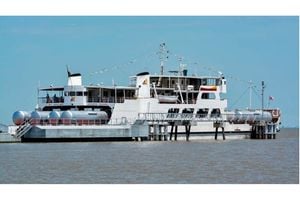Prime
Luzira, police left high and dry over water bill

Luzira prisons gate
What you need to know:
- “The Uganda Prisons Service is currently utilising water bowsers to mitigate the water crisis. Meanwhile, negotiations are ongoing between the Ministry of Finance, Planning, and Economic Development, Ministry of Internal Affairs, UPS, and NWSC to restore the water situation to normal,” Mr Frank Baine, the Uganda Prisions spokesperson.
The police and prison services are facing a severe water crisis after the National Water and Sewerage Corporation (NWSC) cut off their supply due to outstanding arrears amounting to Shs43.3 billion.
These arrears have accumulated over several years, and NWSC, citing its financial obligations, can no longer afford the loss.
Luzira Prisons Complex, the largest prison facility in the country, and Naguru Police Barracks, the second largest police accommodation, are among the facilities affected by the water cut-off.
Senior Commissioner of Prisons Frank Baine expressed deep concern over the situation, calling it a “matter of national concern.”
He stated: “The Uganda Prisons Service is currently utilising water bowsers to mitigate the water crisis. Meanwhile, negotiations are ongoing between the Ministry of Finance, Planning, and Economic Development, Ministry of Internal Affairs, UPS, and NWSC to restore the water situation to normal.”
The Uganda Prisons Service (UPS) alone has arrears amounting to Shs5.6 billion. Police barracks like Naguru, which were also cut off, are facing similar challenges.
Police officers now have to fetch water from a spring two kilometers away, despite the spring being previously declared contaminated by city authorities.
One officer from Naguru Police Barracks said: “The entire area is covered with a foul odor because many residents can’t flush their toilets. Some are using minimal water to flush manually, causing the sewer pipes to clog.”
The police have arrears totaling Shs23.8 billion, while UPS’s total water bill stands at Shs19.4 billion.
In July, several government agencies agreed that the arrears would be cleared in the first quarter of this financial year.
Accordingly, the Ministry of Finance, Planning, and Economic Development released Shs9.4 billion to Prisons and Shs5.9 billion to the police to clear their water bill arrears, with the details of these releases shared with NWSC.
However, by August 4, 2024, the funds had not been transferred to NWSC, prompting the water supply cut-off.
NWSC has since demanded payment from the two institutions, noting that only partial payments have been made.
The NWSC spokesman, Mr Samuel Apedel, said: “It wasn’t our wish to cut off water supply to our clients, the police and prisons, but we are also faced with huge bills that need to be cleared if we are to effectively deliver services to the public. We have to pay Umeme (the power supplier), purchase chemicals to treat the water, and pay our workers. We can only do that if our clients pay their bills.”
Last year, Umeme also threatened to disconnect NWSC over delayed payments.
Former Inspector General of Police Martins Okoth-Ochola had previously proposed the installation of solar energy and drilled water facilities to reduce utility bills.
He said: “The institution also intends to massively install solar gadgets for lighting, drill water for domestic use, and package the same to reduce budget leakages on utilities, support operations, and also participate in production.”
Despite the police budget allocating around Shs17 billion for power and Shs11 billion for water bills annually, there remains a Shs86 billion gap to cover utility bills each year, leaving the police only able to sustain themselves for four months with the available funds.



